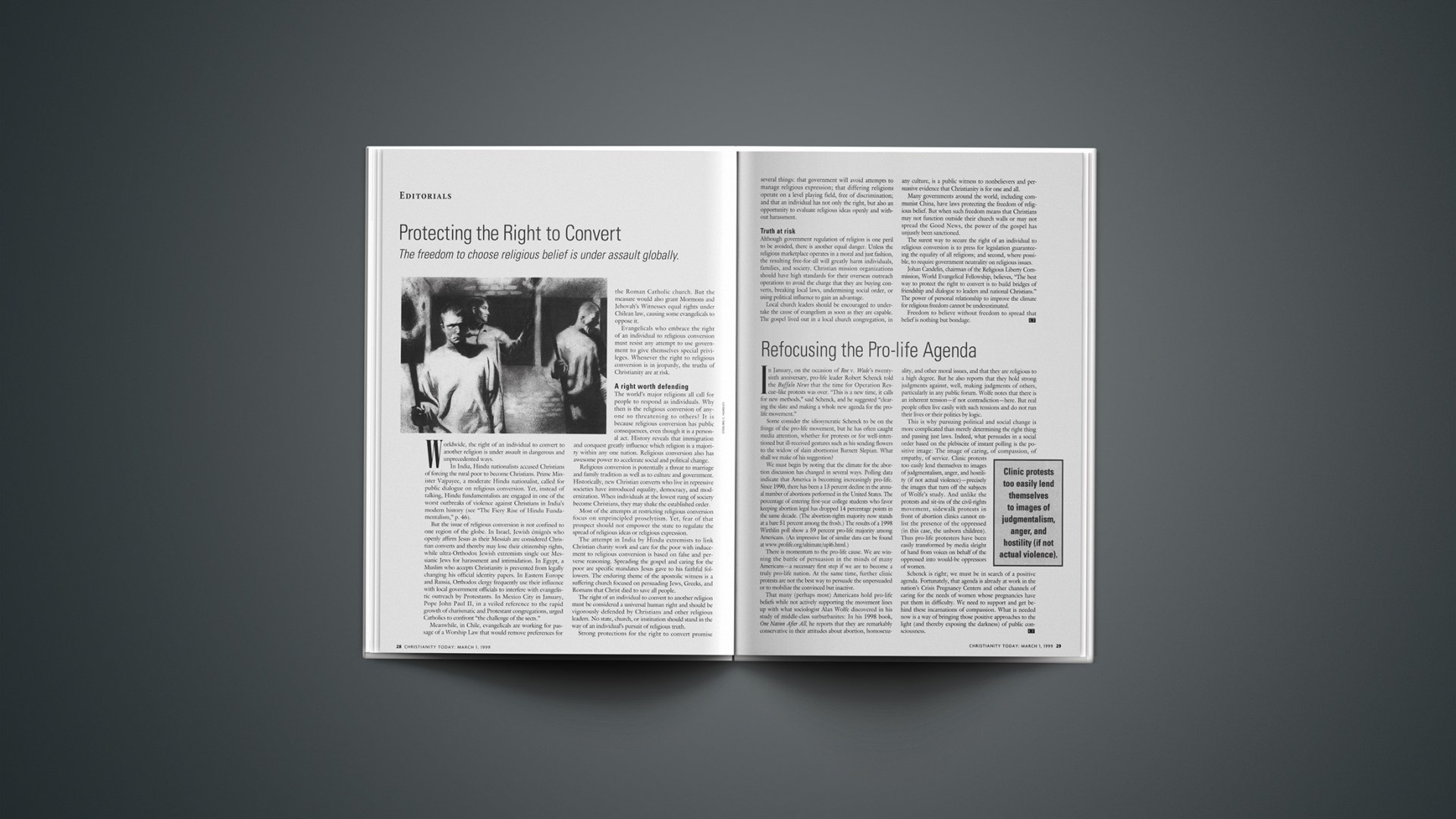In January, on the occasion of Roe v. Wade‘s twenty-sixth anniversary, pro-life leader Robert Schenck told the Buffalo News that the time for Operation Rescue-like protests was over. “This is a new time, it calls for new methods,” said Schenck, and he suggested “clearing the slate and making a whole new agenda for the pro-life movement.”
Some consider the idiosyncratic Schenck to be on the fringe of the pro-life movement, but he has often caught media attention, whether for protests or for well-intentioned but ill-received gestures such as his sending flowers to the widow of slain abortionist Barnett Slepian. What shall we make of his suggestion?
We must begin by noting that the climate for the abortion discussion has changed in several ways. Polling data indicate that America is becoming increasingly pro-life. Since 1990, there has been a 13 percent decline in the annual number of abortions performed in the United States. The percentage of entering first-year college students who favor keeping abortion legal has dropped 14 percentage points in the same decade. (The abortion-rights majority now stands at a bare 51 percent among the frosh.) The results of a 1998 Wirthlin poll show a 59 percent pro-life majority among Americans. (An impressive list of similar data can be found at www.prolife.org/ultimate/upl6.html.)
There is momentum to the pro-life cause. We are winning the battle of persuasion in the minds of many Americans—a necessary first step if we are to become a truly pro-life nation. At the same time, further clinic protests are not the best way to persuade the unpersuaded or to mobilize the convinced but inactive.
That many (perhaps most) Americans hold pro-life beliefs while not actively supporting the movement lines up with what sociologist Alan Wolfe discovered in his study of middle-class surburbanites: In his 1998 book, One Nation After All, he reports that they are remarkably conservative in their attitudes about abortion, homosexuality, and other moral issues, and that they are religious to a high degree. But he also reports that they hold strong judgments against, well, making judgments of others, particularly in any public forum. Wolfe notes that there is an inherent tension—if not contradiction—here. But real people often live easily with such tensions and do not run their lives or their politics by logic.
Clinic protests too easily lend themselves to images of judgmentalism, anger, and hostility (if not actual violence).
This is why pursuing political and social change is more complicated than merely determining the right thing and passing just laws. Indeed, what persuades in a social order based on the plebiscite of instant polling is the positive image: The image of caring, of compassion, of empathy, of service. Clinic protests too easily lend themselves to images of judgmentalism, anger, and hostility (if not actual violence)—precisely the images that turn off the subjects of Wolfe’s study. And unlike the protests and sit-ins of the civil-rights movement, sidewalk protests in front of abortion clinics cannot enlist the presence of the oppressed (in this case, the unborn children). Thus pro-life protesters have been easily transformed by media sleight of hand from voices on behalf of the oppressed into would-be oppressors of women.
Schenck is right; we must be in search of a positive agenda. Fortunately, that agenda is already at work in the nation’s Crisis Pregnancy Centers and other channels of caring for the needs of women whose pregnancies have put them in difficulty. We need to support and get behind these incarnations of compassion. What is needed now is a way of bringing those positive approaches to the light (and thereby exposing the darkness) of public consciousness.
Copyright © 1999 Christianity Today. Click for reprint information.










